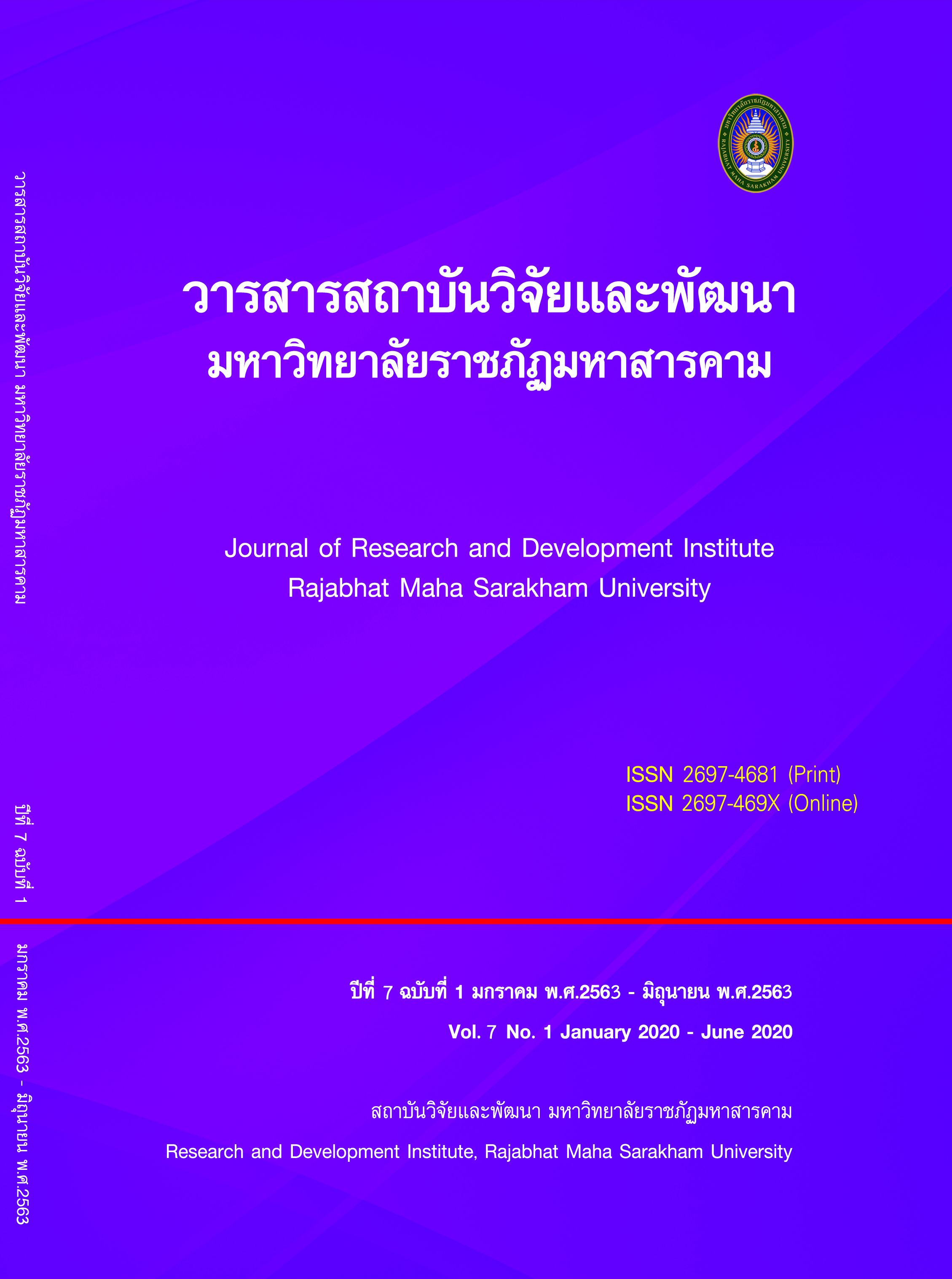Model Development for Academic leadership of teachers with School-Based Training under the Local Government Administration of Kalasin Organization
Keywords:
Teachers’ Academic leadership, School-based trainingAbstract
The purposes of this research were to 1) study the factors and indicators of academic leadership of teachers 2) form the model development for academic leadership of teachers with school-based training under the Local Government Administration of Kalasin Organization and 3) study the result of the research experiment. The research procedures were divided into three phrases. The first stage was to study the components of the academic leadership of teachers by synthesizing the data, focus group discussion and questioning from 234 samples. The second stage was to form the model development of academic leadership for teachers with school-based training by using (Multi Attribute Consensus Reaching: MACR). And the third stage was to study the result of the research experiment with 1 school and 18 target group.
The results found that: (1) The factors and indicators of academic leadership of teachers with school-based training under the Local Government Administration of Kalasin Organization comprised of 1) the model of teaching comprised 4 sub- factors and 17 indicators, 2) learning achievement comprised 4 sub- factors and 9 indicators, 3) professional teacher comprised 4 sub- factors and 16 indicators and 4) participatory in development of quality education comprised 5 sub- factors and 13 indicators. (2) The model comprised of 1) principles 2) objectives 3) activities 4) content 5) instructional media 6) time and 7) assessment. The result of evaluation for accuracy, possibility and utilities was the highest in overall. And (3) The result of the experiment using the model development of the academic leadership of teachers with school-based training under the Local Government Administration of Kalasin Organization was in the highest level of the average.
References
References
Bangkok Primary Educational Service Area Office 3. (2010). The development of teacher quality by empowerment. Bangkok: Supervision, Monitoring, and evaluation for educational pro.
Eisner, E. (1976). “Educational Connoisseurship and Criticism: Their form and Functions in Educational Evaluation,” Journal of Aesthetic Evaluation or Education. 10, 1976.
Fullan, Michael G. (1993). “Why Teachers Must Become Change Agents”. Educational Leadership. 50 (7), March.
Jakgree Tonchua. (2012). The Development of a Leadership Enhancement Program for Students' Association Committee of Northeastern Technical Colleges under the Office of the Vocational Education Commission. Doctor of Educational (Leadership Educational Administration). Sakon Nakhon: Sakon Nakhon Rajabhat University.
Jiraporn Amonchai. (2010). The Development of Leadership Program of Local Administrators Under Local Government. Doctor of Education (Educational Administration and Development). Mahasarakham: Mahasarakham University.
Krongthip Nakvichet. (2014). A Model for Leadership Development of Private University Student Leaders. Nakhon Ratchasima: Vongchavalitkul University.
McCauley, C.D., & others. (1998). The Center for Creative Leadership: Handbook of Leadership Development. San Francisco: Jossey – Bass.
Muijs, D. and A. Harris. 2003. “Teacher Leadership – Improvement through Empowerment? An Overview of the Literature.” Educational Management and Administration. 31 (4): 437-448.
Office of the Basic Education Commission. (2016). Bureau of Education Innovation. Bangkok: Pimdeekarnpim.
Office of the Education Council. (2010). A research report: Research and development of teachers and education personnel professional development policies. Bangkok: Prikwarn Graphic.
Office of the Education Council. (2013). Education in Thailand. Prigwan Graphic Co., Ltd
Pavida Tharasrisuthi. (2004). Leadership and ethics for educational administration. Bangkok: Ramkhamhaeng University.
Pellicer, L. O. and Anderson, L. W. (1995). A handbook for teacher leaders. Thousand Oaks, CA: Corwin Press.
Prachid sakunapat and Udom Choikiwon. (2006). Important day. Bangkok: Poompanya.
Preeyaporn Wong-Anudroj. (2010). Instructional management. Bangkok: Printing co.,ltd.
Pudis Padpin. (2014). Development of School Administration Model Through the Sufficient Economy Philosophy under Office of the Basic Education Commission. Doctor of Education (Educational Administration). Pathumthani: Valaya Alongkorn Rajabhat University.
Strodl, P. (1992). A model of teacher leadership. Paper presented at the annual meeting of the Eastern Educational Research Association, Hilton Head, SC.
Suranna, K. J. (2000). The nature of teacher leadership: A case study of elementary school teachers from a five-year teacher education program. Doctoral dissertation, University of Connecticut, Storrs.
Sureerat Phuttanatein. (2009). Model of Teacher Leadership Capacity in Basic Educational Institutions. Doctor of Education (Educational Administration), Educational Administration, Department of Education. Bangkok: Kasetsart University.
Suwimon Wongwanich. (2016). Classroom action research (18th ed). Bangkok: Chulalongkorn University Publisher.
Thailand Development Research Institute. (2013). Full Report of the Preparation of a Strategic Reform of Basic Education to Responsibility. Bangkok: The Foundation of the Thailand Development Research Institute.
Varakorn Samakoses. (2010). Proposing a suitable educational system suitable for healthy Thai people. Bangkok: Pappim.
Vincere, A.A., & Fulmer, R.M. (1998). Leadership by design. Boston: Harvard Business School Press.
Wimol Jankaew. (2012). A creative leadership development model for the school directors of Suratthani primary education service area office 3. Doctor of Education (Educational). Pathumthani: Rungsit University.
Yordanong Jomhongbhibhat. (2010). Development of a program for developing instructional leadership in learning management based on the educational reform of basic education. Doctor of Educational (Leadership Educational Administration). Sakon Nakhon: Sakon Nakhon Rajabhat University.
Downloads
Published
How to Cite
Issue
Section
License
Articles that are published are copyrighted by the authors of the articles







